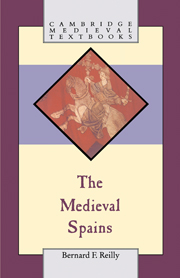Book contents
- Frontmatter
- Contents
- Maps
- 1 At the edge of empire
- 2 The Germanic kingdom in Iberia, 569–711
- 3 Iberia and the dār-al-Islam, 711–1009
- 4 Christian reconquista and African Empire, 1009–1157
- 5 The definition of Iberian autonomy: 1157–1295
- 6 The evolution of the medieval order in Iberia
- 7 The passing of medieval Iberia, 1248–1474
- An introductory bibliography
- Index
- Cambridge Medieval Textbooks
7 - The passing of medieval Iberia, 1248–1474
Published online by Cambridge University Press: 05 June 2012
- Frontmatter
- Contents
- Maps
- 1 At the edge of empire
- 2 The Germanic kingdom in Iberia, 569–711
- 3 Iberia and the dār-al-Islam, 711–1009
- 4 Christian reconquista and African Empire, 1009–1157
- 5 The definition of Iberian autonomy: 1157–1295
- 6 The evolution of the medieval order in Iberia
- 7 The passing of medieval Iberia, 1248–1474
- An introductory bibliography
- Index
- Cambridge Medieval Textbooks
Summary
Despite all of the elements of continuity that marked the peninsula in the two centuries between the fall of Seville and the accession of the Catholic kings, some of its structures and verities were being altered beyond recognition. One of these was the role of Islam there. Though it was far from immediately clear, the thirteenth-century Christian conquest of Andalusia and Murcia was to be irreversible. It would take another century and Río Salado to demonstrate definitively that salvation was no longer to be looked for on the plains of Morocco, but the acuter minds of the age must have grasped that fact even sooner. Islamic Iberia was thrown back upon its own resources and they were to prove insufficient even so soon as the great revolts of 1264 in Andalusia and of 1274 in Valencia.
Both of those abortive risings were the result of the intrigues of Muhammad I (1237–1273) and of his son and successor Muhammad II (1273–1320) of Granada. In the first of them it was demonstrated fairly rapidly that the sinews of Spanish Islam alone continued to be no match for the combined might of Castile and Aragon which was hurled against them. The second rising was a reaction to the first invasion of Iberia by Banū Marin of Morocco but the rebels were ground down inexorably when aid failed to reach them from the Africans.
- Type
- Chapter
- Information
- The Medieval Spains , pp. 190 - 209Publisher: Cambridge University PressPrint publication year: 1993



